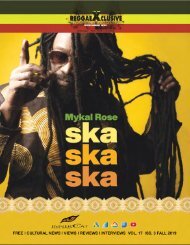Queen Street News Toronto
Queen Street News Toronto
Queen Street News Toronto
You also want an ePaper? Increase the reach of your titles
YUMPU automatically turns print PDFs into web optimized ePapers that Google loves.
Theatre: The Chairs, 2012 <strong>Toronto</strong> Fringe Festival<br />
In the case where the self is merely<br />
represented and ideally presented<br />
(vorgestellt), there is not actual: where it is by<br />
proxy, it is not.<br />
- Hegel, “Phenomenology of Mind”<br />
“The Absent Society”<br />
The Stray Theatre Company is<br />
staging Eugène Ionesco’s<br />
masterpiece, The Chairs, at the<br />
2012 <strong>Toronto</strong> Fringe Festival.<br />
This tragic farce by the visionary<br />
Absurdist is performed in the<br />
dimly lit space of the Randolph<br />
Theatre. Out of the darkness<br />
emerge an Old Man (Michael<br />
Greves) and an Old Woman (Dawn<br />
E. Crysler); she sits in stillness<br />
for a time, staring ahead into the<br />
bleak abyss, while her husband<br />
lingers at a window. Intoxicated<br />
by the nocturnal landscape, he<br />
gazes at the amorphous shadows<br />
that form upon the surface of the<br />
sea. The woman becomes<br />
suddenly hysterical as she<br />
ponders the treacherous,<br />
midnight water that surrounds<br />
them, seeping in through the<br />
walls and windows of her<br />
psyche. To distract themselves<br />
they engage in the pursuit of a<br />
realm that resides in imagination<br />
and memory, a recurring<br />
intrigue, a resolution to the<br />
boredom of habitual solitude.<br />
The sea becomes symbolic of the<br />
unconscious fantasy, and the<br />
boundary between illusion and<br />
reality is progressively obscured.<br />
Through incantations of<br />
tenderness and self-pity,<br />
expressions of beauty and<br />
ugliness, arises the notion of a<br />
sacred duty to communicate a<br />
Message to the universe, to all of<br />
humanity. The play is<br />
thematically concerned with the<br />
deterioration of language and<br />
the profound effect this<br />
produces on the collective, the<br />
alienation of man (not only from<br />
the other but from himself as<br />
well), and the resistance to the<br />
experience of existential beingin-itself,<br />
rather illusion becomes<br />
sacred as it provides a<br />
withdrawal from life. “Within our<br />
words we find ourselves,” writes<br />
Ionesco, implying that it is<br />
through language that we may be<br />
able to perceive ourselves and<br />
furthermore, we construct our<br />
perception of the subjective or<br />
objective notion of what<br />
constitutes reality. On stage,<br />
chairs continue to appear, but<br />
remain empty; this lack becomes<br />
the symbolic image of the old<br />
couple’s intended distortion of<br />
objective reality. However, their<br />
mutual fantasy is abruptly<br />
shattered with the arrival of the<br />
Orator (Devon Jones), whose<br />
presence<br />
becomes<br />
overwhelmingly ‘real’. He has<br />
come to relay the Message, and<br />
since their purpose then is<br />
ultimately fulfilled, the Old Man<br />
and Woman resolve to commit<br />
suicide. From the windows they<br />
leap into the murky water,<br />
preferring the nothingness of<br />
death to reality. The Orator,<br />
remaining alone with the ‘crowd’,<br />
attempts to speak. With<br />
incomprehensible utterances he<br />
struggles to make himself<br />
understood, and we realize that<br />
he is deaf and mute. In a moment<br />
of ingenuity, he writes on the<br />
chalkboard “Angel Food”,<br />
unsatisfied he then writes,<br />
“Adieu,<br />
AAAMMM”.<br />
Contemplating this act he<br />
momentarily stands before the<br />
roomful of specters, then<br />
withdraws with a grandiose bow.<br />
The stage is suffused with<br />
shadows and only a pale<br />
luminescence descends upon<br />
the silhouetted chairs, an array<br />
of voices reverberates in unison<br />
with the murmurs of the<br />
audience, and then softly fades.<br />
Under the direction of Jack<br />
Wieler, The Chairs is performed<br />
with imagination, revealing the<br />
paradoxically random order of<br />
the existence. Ionesco depicts<br />
the bizarre spectacle of the<br />
human condition, and thus his<br />
work remains relevant as it<br />
functions outside of the<br />
temporal. As I sat in the<br />
audience, an enigmatic and<br />
mystical procession of<br />
apparitions crossed the<br />
threshold of reverie and onto the<br />
stage. Indeed, all of Ionesco’s<br />
plays are an extraordinary<br />
experience and I feel that if the<br />
opportunity to witness the<br />
pageantry of intellectual<br />
deviance presents itself, dear<br />
reader, consider it a favorable<br />
circumstance.<br />
torontotheater-reviews.com<br />
is printed in five local papers. Story By: Nikoleta Curcin<br />
cabbagetownnews.com - stclairmagazine.com - bloornews.com - collegestreetnews.com - danforthmagazine.com - queenstreetnews.com Page 13





